
*
At first blush, the idea of adapting Todd Haynes' Oscar-nominated 2002 film "Far From Heaven" into a stage musical feels like an inspired idea. The poignant story, about the unraveling of a picture-perfect suburban Connecticut family in the 1950s, is suffused with roiling emotions, psychological complexity, and a subtle but pointed critique of the sexual and social repression and insidious racism that infected the underbelly of Eisenhower-era America.
But there are real challenges facing the creative team — composer Scott Frankel, lyricist Michael Korie, book writer Richard Greenberg and director Michael Greif — as they prepare to mount what's being called a "preview production" at the Williamstown Theatre Festival in the Berkshires, July 19-29. The first obstacle is the fact Haynes' film was a cinematic celebration/deconstruction of the 1950s weepies of director Douglas Sirk — melodramas like "All That Heaven Allows," "Written on the Wind" and "Imitation of Life." Will the musical adaptation of Far From Heaven, which finds the irrepressible Kelli O'Hara playing heartsick homemaker Cathy Whitaker, largely avoid the winking irony and post-modern deconstruction of Haynes' homage?
The story centers on a tortured middle class advertising executive, Frank Whitaker, as he wrestles with the secret of his homosexuality, while his perfectly-composed, put-upon wife Cathy grapples with a burgeoning attraction to her widowed African-American gardener, Raymond Deagan. As Cathy and Raymond ever-so-tentatively act on their feelings, they're ostracized by their respective communities.
The film, which starred Julianne Moore, Dennis Quaid, Dennis Haysbert and Patricia Clarkson, captured the restrained, emotionally-clenched sensibility of the 1950s to rapturous effect. Haynes employed eye-popping bursts of color and hyper-stylized visuals to evoke the forbidden desires and incendiary passions percolating just below the repressed facade of the decade's social mores. Musicals, in their own way, traffic in artifice. So the Far From Heaven creative team has approached their adaptation with the idea that the music and songs would serve a similar purpose to the visual cues, stylizations, cinematography of Haynes' film. Still, musicals are also unrestrained by their very nature — yet the characters are a decidedly repressed bunch.
| |
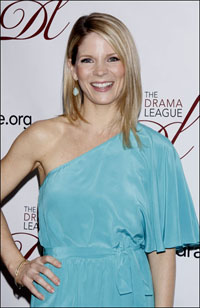 |
|
| Kelli O'Hara | ||
| photo by Joseph Marzullo/WENN |
During an interview over coffee in a midtown cafe, Frankel and Korie, who were nominated for a Tony Award for Best Original Score for Grey Gardens in 2007, talk about their adaptation of "Far From Heaven," which gets its fully fleshed out world premiere next spring at Playwrights Horizons in New York City following this "preview" in Williamstown.
What about the movie made you think it would translate well to the stage, that it would work as a musical?
Scott Frankel: As with Grey Gardens, as soon as we started this process, I started looking at the screenplay, because I wanted to see it on the page divorced from the production elements and performances. The screenplay is also a marvel of economy and construction. It's very lean. It's brilliantly structured and just as good on the page. And it's one of those where you see the train running down the tracks, and you see that it's going to hit the kid and the dog in the car.
Michael Korie: But like Grey Gardens, Scott always picks a musical with an insurmountable problem.
SF: This one was not as insurmountable.
MK: With Grey Gardens, it was: Where was the story? Where was the narrative? So we found one, and we found a way to make a documentary musical. I like these insurmountable challenges. The challenge with this one is that "Far From Heaven" seemed so much like a film, and it referenced cinema. And it was totally underscored, the whole way through, with that fantastic 1950 score by Elmer Bernstein.
SF: We went back and looked at all of those films — "All That Heaven Allows" and "Written on the Wind" and "Imitation of Life," which is a special favorite of mine.
MK: Then you say, Why does this belong on the stage? What kind of validity can you give it? That was the challenge. That was the question that drew me in.
SF: I remember seeing the film in its theatrical release in Chelsea with a kind of smarty-pants, gay, cineaste audience who appreciated the film as a Sirkian homage — all those color-on-color touches, with the leaves matching the dress. But then about four months later, I was in Cleveland visiting my then-90-something-year-old grandmother. The film was still playing, and I took her to see it. She didn't give a shit about Douglas Sirk. She wasn't looking at it as a film studies person. She just thought it was a really good story, and I was fascinated by that. At that moment, I realized that it's working for these two incredibly different constituencies: People looking at it as a kind of post-modern commentary on the past and those films and the artifice of those films and the issues of those films. But then my grandmother was just totally drawn in by the story, of this impossible triangle between this seemingly-perfect couple and then this gardener, who's her soul-mate, but they can't be together because of the social mores of the era.
MK: When I first saw it, I also thought, oh, isn't this clever? And I knew all those Douglas Sirk films. But I didn't necessarily take the story seriously...Sirk was working with these almost inferior soap opera scripts, and he made them interesting and weird and Chekhovian, especially with the way he filmed them — by making the lampshade match the dress match the wallpaper. It's just so weird — that you look at it in different ways.
| |
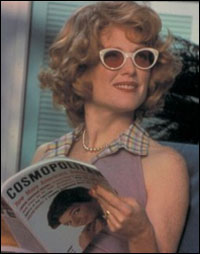 |
|
| Julianne Moore in the film | ||
| Focus Features |
SF: You know, everyone was wondering, "How are you going to deal with the tonal things?" But musicals by their very nature have this artifice, where people are breaking into song. In some ways, it's almost a non-issue. That movie was all about restraint and about what's not spoken. But musicals give you the opportunity to understand the interior life of the characters. I think the songs are the equivalent of close-ups — when they zoom in on Cathy and she doesn't say anything, but you see the pain, the bitter disappointment, the regret and anger on her face. In the musical we hear from her through the songs. So I actually think that in some ways the film was real natural material for an adaptation.
When I saw the film in the movie theatre, the audience was giggling and laughing at all the 1950s Sirkian social conventions and interactions, which seem so foreign and awkward to us today. So there were people in the theatre who appreciated those Sirkian conventions on one level and those who were just uncomfortable with how ridiculous it all seemed.
SF: The language stuff and the winks and nods to the 1950s, I think Haynes did a lot of that intentionally to disarm a contemporary audience. It was a way for him to say to the audience, "You know, you can relax into this. I'm not taking this completely unironic-ly either." Then once he gets them in, they're fully engaged just because the story is so compelling.
MK: But Richard [Greenberg] was very adamant about not getting campy or cute with the adaptation, getting ahead of the audience or catering to the audience. All of that adds a level of remove. So our approach was to take the story seriously and make it realistic. Then use music to dramatize and expand moments that were already there in the film. Like there's that moment where Cathy and Raymond meet at the gallery show, and they start looking at a Miró print. It becomes this rapturous thing. And then you see that everybody in the gallery is staring at them. Music really expanded that moment and made it fantastic. And it just comes out of nowhere. That's what I love.
Also, if I had ever entertained any ideas of doing pastiche-period songs, Richard Greenberg was not into that at all. He took the stories completely seriously. So we went on the assumption that the music would take the place of the stylization and cinematography of the film. When we started writing songs, almost immediately that seemed to prove true. And when we did the first reading, the story just worked, and the music maybe even intensified it. …It's a mostly-music musical — in a Rodgers and Hammerstein vein, where you take the characters seriously. You don't write genre cream-puff songs. You write from character.
SF: I was thinking of [the 1956 Frank Loesser musical] The Most Happy Fella. That was maybe in the back of my head a little bit. A story that has comic elements and has some social commentary, but also has these full-throated expressions of passion and emotion.
| |
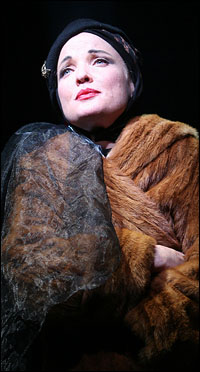 |
|
| Christine Ebersole in Grey Gardens. | ||
| photo by Joan Marcus |
SF: Richard Greenberg is best friends with Patti Clarkson [who played Cathy's best friend Eleanor in Haynes' film]. I've known him a long time, and we've always talked about working on something together. We started brainstorming, and he said, "What about 'Far From Heaven'?" And I said, "That's it." Then I went and saw Christine Vachon at Killer Films and did my best pitch. Then she said, "You should really talk to Todd." So then I went to Portland and talked to Todd, and he was very receptive to the notion of it. So we'll see what happens if he comes to see it, if he's still so receptive to the notion of it then. But I think the adaptation is very faithful to the essence of his work...Sometimes, you know, you need to really stray from the source material in order to be true to the ethos of that original material. There's some musicals that I won't name, but they're like almost exactly the same, except they shoved in some songs! Like I'd rather see it streaming on Netflix than pay $125 for it. So [Haynes] understood that it needed to be reinvented, and he can't wait to see what we've done with it.
So it's a mostly sung-through musical? There isn't much dialogue?
MK: With Grey Gardens, people said, "Oh, what's the big deal? They take the documentary and stick in songs." And they were very careless in making that accusation, because if they compared the two scripts [for Grey Gardens the documentary vs. the musical], they would see that the script for Act Two is almost all Doug [Wright] — written in the style of those two women. And it was the songs that vandalized the actual text and regurgitated them, but in unusual ways. This one is also different. With Grey Gardens, my inroad into the whole thing was "Jerry Likes My Corn." With this one, too, I took a long time to find my way in — much to the frustration of my collaborators. But the thing that finally got me going was the idea of writing a song about Connecticut. And there's this whole genre of terrible "Connecticut" songs. Like Judy Garland and Bing Crosby singing about Connecticut — "I Like Connecticut" or whatever.
SF: It's a funny word — Connecticut.
MK: It is funny. But if audiences take the people in Connecticut and the people in this show are taking it seriously, then that kind of establishes a tonal thing. We can look it. But they're taking it seriously. So we're not making fun of them. But there is a certain kind of distancing going on. So the Connecticut song — "Autumn in Connecticut" — I thought worked like gangbusters, and then the rest of the score was a delight to write.
SF: Fortunately, the Connecticut Song was the first song. So it was good that you got that at the beginning, because otherwise it could have been a roadblock.
| |
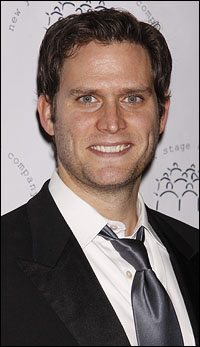 |
|
| Steven Pasquale stars in the musical at Williamstown | ||
| Photo by Joseph Marzullo/WENN |
SF: Part of the reason we also stopped looking at the film is because the movie has this magnificent Elmer Bernstein soundtrack. The score is superb. He was nominated for an Oscar for it, and it was one of the very last pieces that he scored before he died. He should have won the Oscar for it. And it really harkened back to work that he did early in his career in Hollywood. But it's very sweeping and crashing, and there are cymbal rolls, and it's very big and dramatic. I loved it. But I knew that I had to get that out of my ear. However, I did want to keep the bigness of it. I wasn't afraid to be big and to go there. I thought, you know, that's the emotional terrain and topography that those characters are feeling, particularly since so much of [their feelings] are not expressed verbally, so a lot of that passion and the anger and pain is in that music.
But also, I thought, you know, it's 1957. [So] there's one number where I have a kind of Dave Brubeck-Take 5 feeling. There's another thing that sounds a little bit in a West Side Story vein, which was also 1957. There's another song that almost references a Latin-Dean Martin-crooner kind of vibe of that period. There's something that wouldn't sound totally out-of-place in The Pajama Game. It's really eclectic. Then there's very soaring, lyrical stuff, particularly for Kelli and Raymond Deagan, the African-American gardener.
What's your songwriting approach like? Do you start with music or lyrics first?
MK: It's interesting because the lyrics came after the music in this show. Usually we do a back-and-forth thing, or lyrics set an idea and Scott comes up with music, and it goes back-and-forth. But I was sick for the writing of most of this show. I had prostate cancer. And Scott couldn't wait — or we would've been put behind. So he started writing the music. And I responded to the music and wrote words after. I didn't have to jump through hoops. I just really sort of had to take his emotional impulse and follow that. And I think the music really leads us through this show. I think Richard Greenberg respected that, too.
SF: There is a lot of contrast, and it does turn on a dime. When he comes home from the police station, the music is angry and jagged. Then there's lyrical stuff. There's funny stuff. There's big ballads. There's a song at the end of the first act called "The Only One," when he takes her to the bar, and she's the only white person there, it's almost like a rockabilly waltz. I didn't set out to do it this way, but everything that I loved about American popular music from the 1950s to the present kind of went into the Cuisinart of my head and kind of just came out [the other side]. There's a lot of contrast. I like pieces that have big highs and big lows, that aren't all one color. The show has a wide emotional bandwidth.
MK: Scott is very smart about telling a story through music. Every show has to have a certain amount of eclecticism. Operas are written like steadily going up a roller coaster, and the curtain comes down when it hits the top. But musicals, I think, are like an electro-cardiogram — coming down and going up.
| |
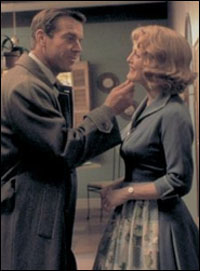 |
|
| Dennis Quaid and Julianne Moore in the film | ||
| photo by Focus Features |
SF: The screenplay is so well-structured, we didn't have to invent a lot of things. That said, you know, as the film goes on, as her relationship with Raymond Deagan, there are these kind of social commentary moments of [about] racism in Hartford and in Miami and the thematic social racism and her relationship with him. Then they kind of intersect, and then they explode together. And she can no longer separate her feelings for this black man with everyone else's feelings about black people.
So for instance, in the film, there's a scene where they're in Miami, and a little black kid, the son of a waiter, dips his foot into the pool. And then [the hotel management] has to drain the pool. He just put his foot in for a second, but then they cut back later, and they show them draining, cleaning, and scrubbing the pool. But we can't have a giant swimming pool on stage. So Richard has come up with equivalent moments that show how the racism [in society] and her relationship with Raymond inexorably collide.
Because of her relationship with him, she's forced to not look at racism in the abstract, but in the context of her relationship with Raymond.
MF: I would also say that the character of Raymond Deagan has changed a bit. In the movie, he was kind of a "Guess Who's Coming to Dinner?"-Sidney Poitier noble character. Not perhaps that sexy. More of a father dealing with his own daughter, and they related to each other maybe through parental issues and respect. Now he's younger, and I think there's more chemistry between them, which I like.
SF: Yes, Dennis Haysbert, who's fantastic in the film, is the noblest, most perfect gentleman. He's strong and kind of a little stoic and is there for her. For the musical adaptation, there's a little more frisson between them. They're soul-mates, but there's also a sexual chemistry there. It's not just this "you understand me" connection.
| |
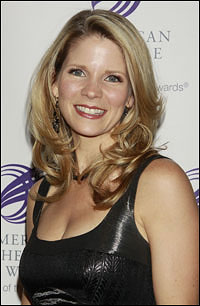 |
|
| Kelli O'Hara | ||
| Photo by Joseph Marzullo/WENN |
MK: Well, Kelli quickly became the muse to this project — just like Christine [Ebersole] became the muse to Grey Gardens.
SF: Well, we always had her in mind because like Julianne Moore she's beautiful and seemingly has this beatific exterior, but she's complicated — in a good way. She's a multi-layered person. She's not an ingenue. And in addition to being great-looking, she has this spectacular voice. And like Christine Ebersole, I quickly kind of became enamored with the instrument. I thought, well, I can write her different kinds of songs — they can be soaring, or there can be something comedic, or there can be something more growling. And she's very fearless. If it calls for her not to sound pretty, she's not afraid to do that and to go there. Plus, she's had great input. That's what's marvelous about having an actress involved early on. We've been able to write stuff for her and stuff that's been at her behest.
Like what? Can you give an example of something she suggested or asked for?
SF: Well, the end of [the show], there's a marvelous scene. Cathy's alone in her house, and she's upstairs, and it's nighttime, and she's in a nightgown, and Frank, her soon-to-be-ex-husband, calls. In the film, the camera pulls back, and you see that he's in the hotel room with a clearly-inappropriate young guy. He's not calling for rapprochement, though you think for a moment maybe that's why he's calling. But what he's really calling for is that the divorce papers are drawn up, and he needs to find a time for her to come sign them. But he can never remember her car pool days. So I had this idea, and Michael ran with it, for a song called "Tuesdays-Thursdays." And that line in the screenplay is so brilliant. She's like, "You could never remember my car pool days. And they've always been the same."
So we have this scene where, in essence, you iris down on the husband and the phone call, and she just lets out this roller coaster, which builds and builds, of rage and fury. The fact that he can't remember her [car pool days] is emblematic of how he regards her. He doesn't understand her, never understood her, never bothered to care about understanding her. Then it totally goes back to, "Hello, Cathy, are you still there? Are you still there?" Meanwhile, she's had this whole tour-de-force aria of emotions, and she very calmly says, "I'm still here." I love that moment. And Kelli asked for it, and she was absolutely right.
MK: She was right. I didn't think Richard wanted it at first. Then after we wrote it, he wanted us to write a second verse — to make it longer. [Laughs.] SF: Without it being cliched and hackneyed, I think that Cathy experiences an incredible personal awakening throughout the course of the show. And it was wildly painful for her. But at least she's alive and feeling and not in this more plastic, seemingly perfect existence. She's warts and all now. And sometimes those are very real body blows. As I said, we don't shy away from her second act downfall. The piece is very bittersweet. She really does get knocked around badly. We learn that the husband is gay and has left her for this twinkie; we learn that she can't be with the gardener. She's ostracized by the town.
| |
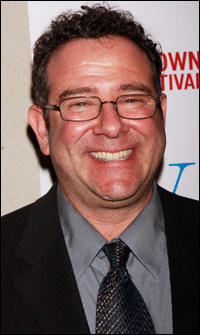 |
|
| Director Michael Greif | ||
| photo by Joseph Marzullo/WENN |
SF: When we had this idea for the show, we took it to Tim Sanford [the artistic director at Playwrights Horizons]. We had such a happy experience there with Grey Gardens, and he loved the idea. And we got this amazing Mellon Foundation grant. It's quite remarkable. They provide for two productions — an out-of-town leg and then a second production in New York.
MK: So it means that there's no commercial enhancements at all. None.
SF: But we have this amazing grant, which was our commission to write it and enhances both productions. But it's still a big cast and a big orchestra.
MK: It's got 19 people, which is huge for Playwrights Horizons or Williamstown…It's very big for a non-profits to do by themselves. So we're very gratified that they're doing it.
You also have on tap the musical adaptation of the 2004 Johnny Depp film "Finding Neverland," which will get a tryout at the Curve Theatre in Leicester, U.K., starting in September. The show features a book by Allan Knee, whose off-Broadway play The Man Who Was Peter Pan inspired the film.
SF: In fact, the last performance for Far From Heaven is the 29th of July. And then the first day of rehearsals for Neverland is Aug. 6 — in London. And in the way that audiences bring a pre-existing relationship with "The Wizard of Oz" when they see Wicked, the same holds true with Finding Neverland and the iconic "Peter Pan."
What about creating a musical adaptation of "Finding Neverland" appealed to you? What did you find so fascinating about J.M. Barrie and the Davies family, who inspired the author to write "Peter Pan"?
SF: I was attracted to the central theme of a man who is at a crossroads in his personal and professional existence. He's had his imagination awakened by meeting Sylvia and her boys. And he discovers that his salvation and path out of the Shadows and Fog — which is one of the songs! — is to take threads from his own life and weave it into a work of fiction, fantasy and magic.
Can you briefly describe your approach to writing the music (and lyrics) for the show? What does the music in the show sound like?
SF: The score is sweeping and melodic — and I was happy to pepper it with nods to the English musical hall; madrigals; Elgar; even hints of Gilbert & Sullivan. Barrie and Sylvia both have soaring ballads. There are also a swashbuckling number for pirates which is great fun. I also took the opportunity to write some thorny, complex material for the four boys. Peter, in particular, has a tour de force, mixed meter song called "Do I Know You?" that is not the kind of ditty one is accustomed to hearing from a child. The lads are precocious English schoolboys, so I felt that gave me license to "write up" rather than write down to them. We have some terrific kids on board for the production; twelve of them, in fact. Four boys times three casts, a la Billy Elliot.
Christopher Wallenberg is a Brooklyn-based arts and entertainment reporter and regular contributor to the Boston Globe, Playbill and American Theatre magazine. He can be reached at [email protected].










